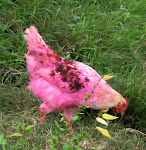The castle is really grim, and it is almost as tough to write about it as it was to walk through it. We went there in March, but I’m still not able to tell you everything I saw and felt. Slavery has long been a part of human history; defeated warriors became slaves, the father asked his slave to prepare the Fatted Calf for the Prodigal Son, etc. The Greeks, the Romans, the Visigoths, and Native Americans all captured or held slaves and whatever women became the spoils of war. However, it took the Brits and the Americans to industrialize it, and the stain is with us still.
We had a terrific guide, a young Christian Ghanaian man, who was very professional and knowledgeable, and who never glossed over the fact that it was other Africans who raided villages and sold their kinsmen for the best price possible to the slavers. You can even visit another site where the prisoners were held and evaluated for strength and capability before being moved to the castle for the final sale. The guide’s professionalism slipped a bit, just once, when he talked about white men and women worshiping in a chapel they had built directly above the women’s dungeon. Somehow he was personally offended by that. Me too. But we all came out of the dungeon with such strong images that it was hard to blink in the daylight. A young black woman from the US wept openly, and I also would have but felt she was more entitled to her tears than I was to mine. Then the guide asked us to read an inscribed marble plaque at the exit. It asked us all to remember what we had seen, and to pledge that we would never permit such a thing to happen again. Ever. To anyone.
I couldn’t speak, because I knew that even as we read it a 12-year old girl was being pimped out of a 4-car garage in Southern California, a 9-year old was being molested by her father in Iowa, some parents somewhere in Asia were selling their prettiest daughter in order to buy food for the rest of the family, and other parents have locked their daughter in a small room until she agrees to marry her cousin. So it is happening, not again, but still; and we don’t really want to know, because we feel so helpless to change it. Please at least just think about it, and maybe our collective energy can fashion some kind of global change. The book, Half The Sky, by Nicholas Kristof and Sheryl WuDunn, is a bit hard to read at first, but it’s not sensationalistic and they do offer hope and some real strategies that could make a difference.
Back to the castle, being witness to such commercialism of pain and squalor is pretty tough. And I’m not saying that slavery was ever a good thing for any nation, so don’t be sending me any hate mail. But sometime later, when I was alone at home, I lit a candle to honor the ancestors. I wanted to celebrate the fact that they survived such horror, and to express my gratitude that because of their strength and courage their descendents, my black friends in America, are living where they are.
Subscribe to:
Post Comments (Atom)

No comments:
Post a Comment